Talent Management's Impact on Staff Performance at Sainsbury's
VerifiedAdded on 2022/12/15
|18
|4622
|345
Report
AI Summary
This report presents a research project on the role of talent management and its implications for enhancing staff performance within Sainsbury's. The introduction outlines the research aim, objectives, and questions, focusing on identifying the role of talent management, its impact on Sainsbury's future growth, talent management frameworks, and the challenges faced. A literature review explores the importance of talent management in attracting and retaining high-quality employees, its influence on business performance, and the significance of talent management frameworks. The research methodology employs a positivism philosophy, deductive approach, and both primary and secondary data collection methods, including a questionnaire with 30 employees. The report discusses sampling, research instruments, ethics, and reliability and validity considerations. The data analysis and interpretations section, along with the research outcomes (covered in a PPT), are followed by conclusions and recommendations. The final chapter includes reflections and recommendations for alternative research methodologies. The report provides insights into the significance of talent management for improving employee performance and organizational success within Sainsbury's.
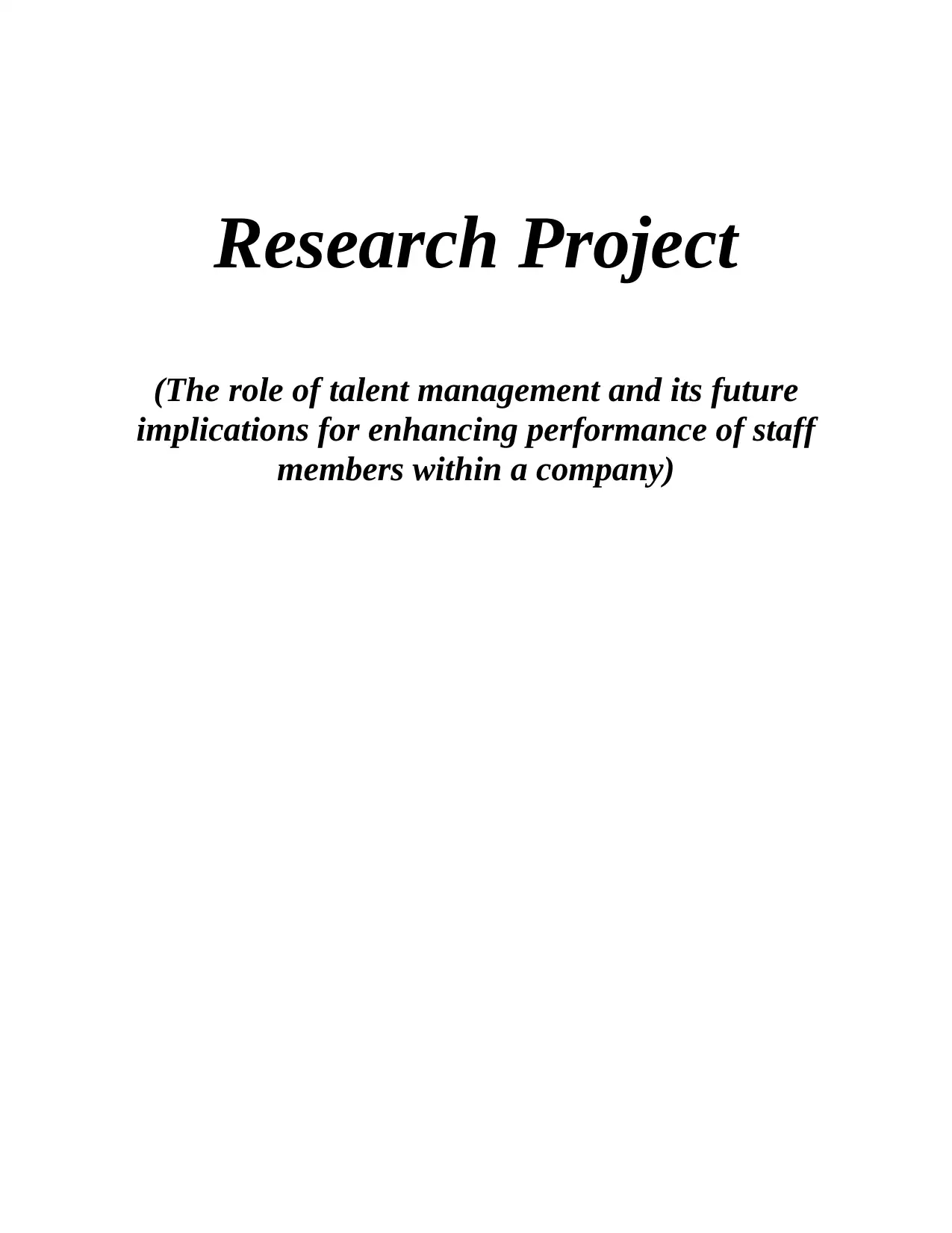
Research Project
(The role of talent management and its future
implications for enhancing performance of staff
members within a company)
(The role of talent management and its future
implications for enhancing performance of staff
members within a company)
Paraphrase This Document
Need a fresh take? Get an instant paraphrase of this document with our AI Paraphraser
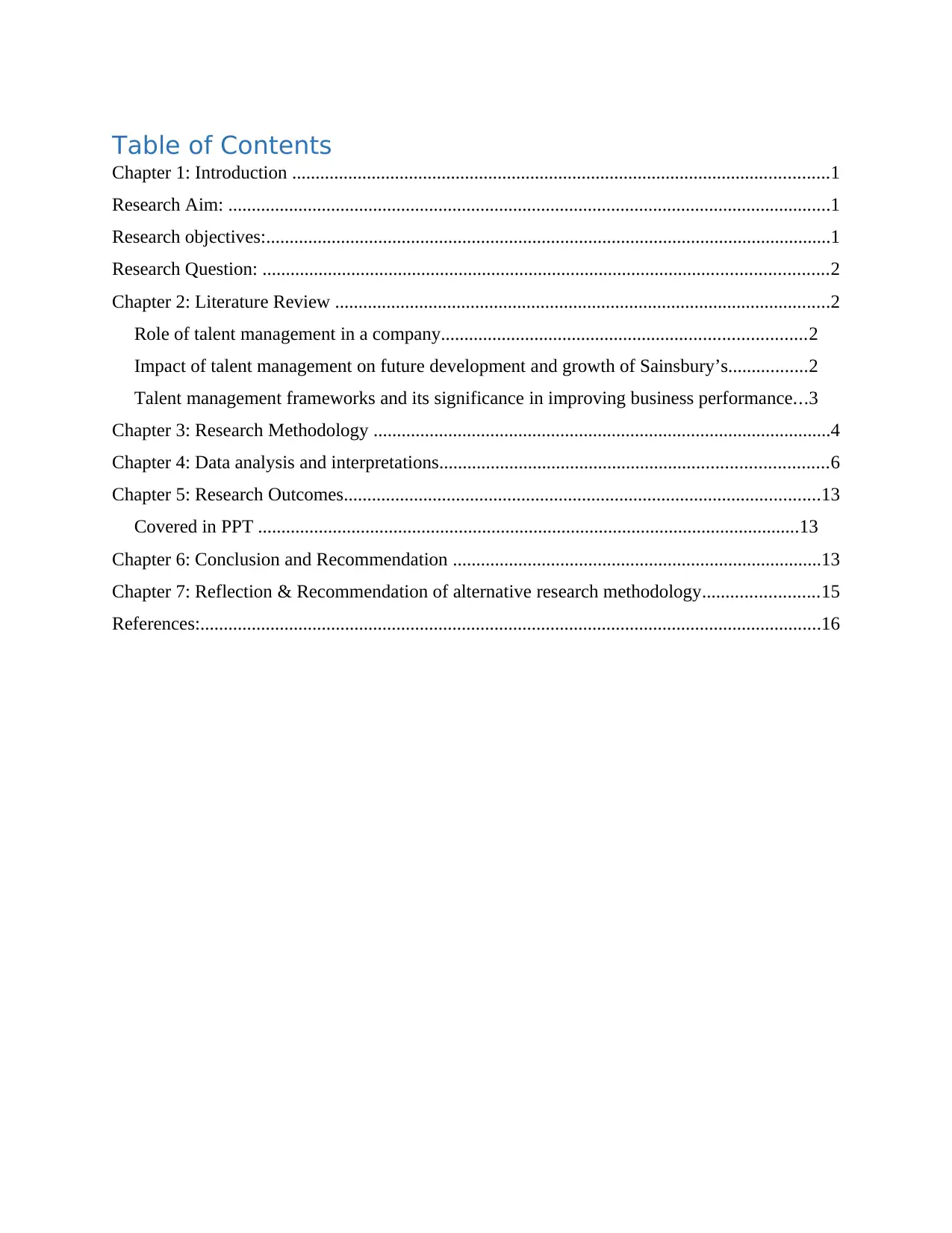
Table of Contents
Chapter 1: Introduction ...................................................................................................................1
Research Aim: .................................................................................................................................1
Research objectives:.........................................................................................................................1
Research Question: .........................................................................................................................2
Chapter 2: Literature Review ..........................................................................................................2
Role of talent management in a company..............................................................................2
Impact of talent management on future development and growth of Sainsbury’s.................2
Talent management frameworks and its significance in improving business performance...3
Chapter 3: Research Methodology ..................................................................................................4
Chapter 4: Data analysis and interpretations...................................................................................6
Chapter 5: Research Outcomes......................................................................................................13
Covered in PPT ....................................................................................................................13
Chapter 6: Conclusion and Recommendation ...............................................................................13
Chapter 7: Reflection & Recommendation of alternative research methodology.........................15
References:.....................................................................................................................................16
Chapter 1: Introduction ...................................................................................................................1
Research Aim: .................................................................................................................................1
Research objectives:.........................................................................................................................1
Research Question: .........................................................................................................................2
Chapter 2: Literature Review ..........................................................................................................2
Role of talent management in a company..............................................................................2
Impact of talent management on future development and growth of Sainsbury’s.................2
Talent management frameworks and its significance in improving business performance...3
Chapter 3: Research Methodology ..................................................................................................4
Chapter 4: Data analysis and interpretations...................................................................................6
Chapter 5: Research Outcomes......................................................................................................13
Covered in PPT ....................................................................................................................13
Chapter 6: Conclusion and Recommendation ...............................................................................13
Chapter 7: Reflection & Recommendation of alternative research methodology.........................15
References:.....................................................................................................................................16
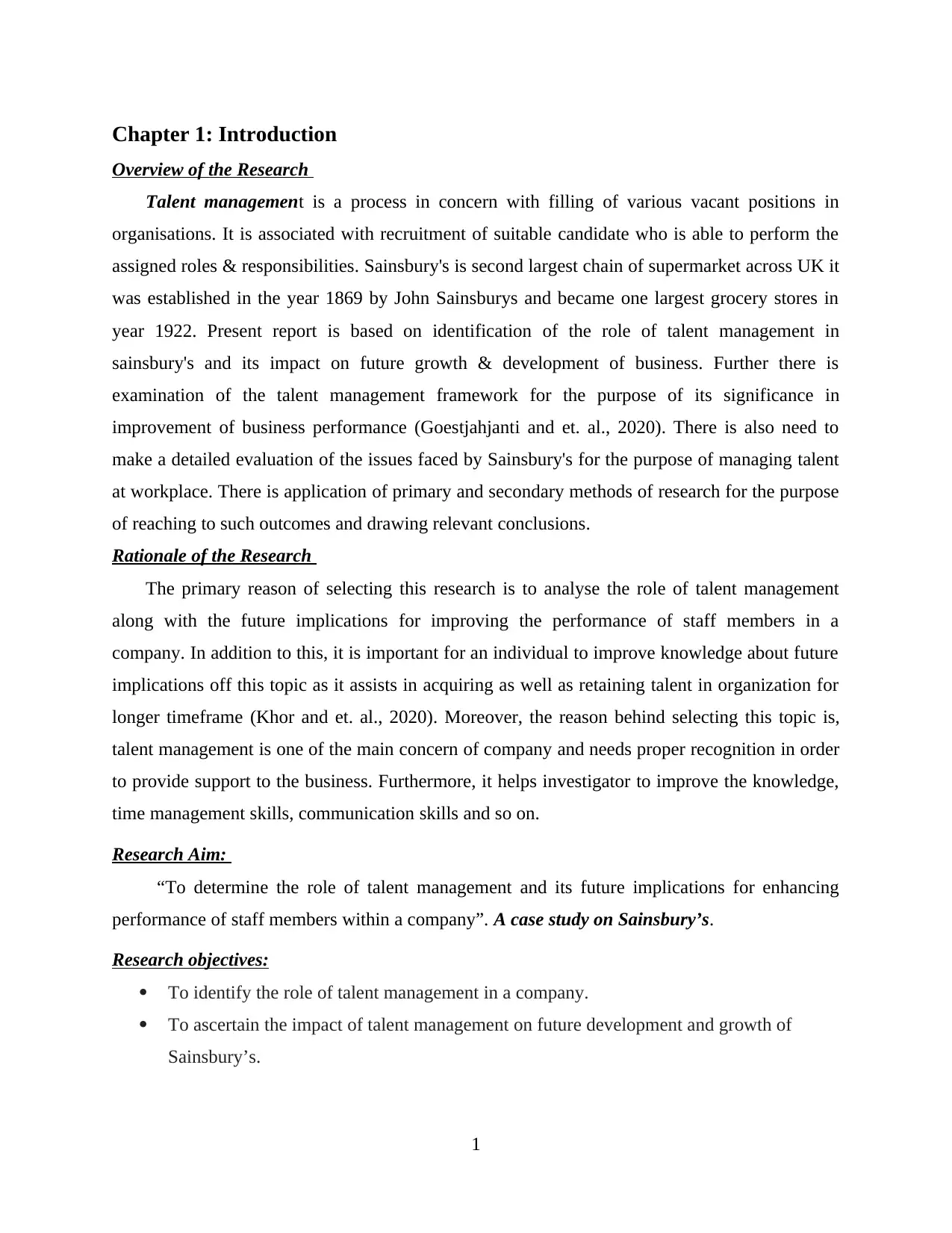
Chapter 1: Introduction
Overview of the Research
Talent management is a process in concern with filling of various vacant positions in
organisations. It is associated with recruitment of suitable candidate who is able to perform the
assigned roles & responsibilities. Sainsbury's is second largest chain of supermarket across UK it
was established in the year 1869 by John Sainsburys and became one largest grocery stores in
year 1922. Present report is based on identification of the role of talent management in
sainsbury's and its impact on future growth & development of business. Further there is
examination of the talent management framework for the purpose of its significance in
improvement of business performance (Goestjahjanti and et. al., 2020). There is also need to
make a detailed evaluation of the issues faced by Sainsbury's for the purpose of managing talent
at workplace. There is application of primary and secondary methods of research for the purpose
of reaching to such outcomes and drawing relevant conclusions.
Rationale of the Research
The primary reason of selecting this research is to analyse the role of talent management
along with the future implications for improving the performance of staff members in a
company. In addition to this, it is important for an individual to improve knowledge about future
implications off this topic as it assists in acquiring as well as retaining talent in organization for
longer timeframe (Khor and et. al., 2020). Moreover, the reason behind selecting this topic is,
talent management is one of the main concern of company and needs proper recognition in order
to provide support to the business. Furthermore, it helps investigator to improve the knowledge,
time management skills, communication skills and so on.
Research Aim:
“To determine the role of talent management and its future implications for enhancing
performance of staff members within a company”. A case study on Sainsbury’s.
Research objectives:
To identify the role of talent management in a company.
To ascertain the impact of talent management on future development and growth of
Sainsbury’s.
1
Overview of the Research
Talent management is a process in concern with filling of various vacant positions in
organisations. It is associated with recruitment of suitable candidate who is able to perform the
assigned roles & responsibilities. Sainsbury's is second largest chain of supermarket across UK it
was established in the year 1869 by John Sainsburys and became one largest grocery stores in
year 1922. Present report is based on identification of the role of talent management in
sainsbury's and its impact on future growth & development of business. Further there is
examination of the talent management framework for the purpose of its significance in
improvement of business performance (Goestjahjanti and et. al., 2020). There is also need to
make a detailed evaluation of the issues faced by Sainsbury's for the purpose of managing talent
at workplace. There is application of primary and secondary methods of research for the purpose
of reaching to such outcomes and drawing relevant conclusions.
Rationale of the Research
The primary reason of selecting this research is to analyse the role of talent management
along with the future implications for improving the performance of staff members in a
company. In addition to this, it is important for an individual to improve knowledge about future
implications off this topic as it assists in acquiring as well as retaining talent in organization for
longer timeframe (Khor and et. al., 2020). Moreover, the reason behind selecting this topic is,
talent management is one of the main concern of company and needs proper recognition in order
to provide support to the business. Furthermore, it helps investigator to improve the knowledge,
time management skills, communication skills and so on.
Research Aim:
“To determine the role of talent management and its future implications for enhancing
performance of staff members within a company”. A case study on Sainsbury’s.
Research objectives:
To identify the role of talent management in a company.
To ascertain the impact of talent management on future development and growth of
Sainsbury’s.
1
⊘ This is a preview!⊘
Do you want full access?
Subscribe today to unlock all pages.

Trusted by 1+ million students worldwide
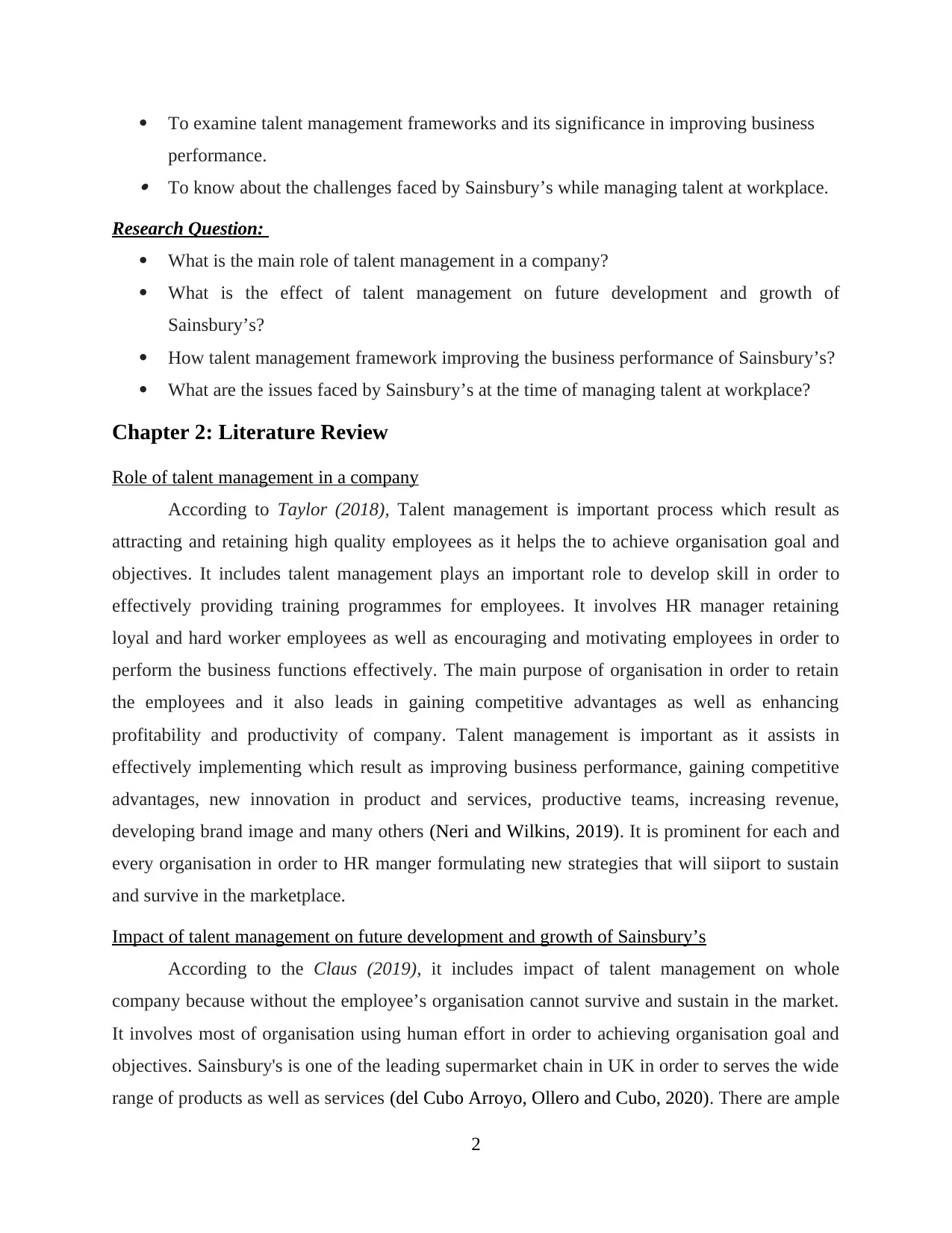
To examine talent management frameworks and its significance in improving business
performance. To know about the challenges faced by Sainsbury’s while managing talent at workplace.
Research Question:
What is the main role of talent management in a company?
What is the effect of talent management on future development and growth of
Sainsbury’s?
How talent management framework improving the business performance of Sainsbury’s?
What are the issues faced by Sainsbury’s at the time of managing talent at workplace?
Chapter 2: Literature Review
Role of talent management in a company
According to Taylor (2018), Talent management is important process which result as
attracting and retaining high quality employees as it helps the to achieve organisation goal and
objectives. It includes talent management plays an important role to develop skill in order to
effectively providing training programmes for employees. It involves HR manager retaining
loyal and hard worker employees as well as encouraging and motivating employees in order to
perform the business functions effectively. The main purpose of organisation in order to retain
the employees and it also leads in gaining competitive advantages as well as enhancing
profitability and productivity of company. Talent management is important as it assists in
effectively implementing which result as improving business performance, gaining competitive
advantages, new innovation in product and services, productive teams, increasing revenue,
developing brand image and many others (Neri and Wilkins, 2019). It is prominent for each and
every organisation in order to HR manger formulating new strategies that will siiport to sustain
and survive in the marketplace.
Impact of talent management on future development and growth of Sainsbury’s
According to the Claus (2019), it includes impact of talent management on whole
company because without the employee’s organisation cannot survive and sustain in the market.
It involves most of organisation using human effort in order to achieving organisation goal and
objectives. Sainsbury's is one of the leading supermarket chain in UK in order to serves the wide
range of products as well as services (del Cubo Arroyo, Ollero and Cubo, 2020). There are ample
2
performance. To know about the challenges faced by Sainsbury’s while managing talent at workplace.
Research Question:
What is the main role of talent management in a company?
What is the effect of talent management on future development and growth of
Sainsbury’s?
How talent management framework improving the business performance of Sainsbury’s?
What are the issues faced by Sainsbury’s at the time of managing talent at workplace?
Chapter 2: Literature Review
Role of talent management in a company
According to Taylor (2018), Talent management is important process which result as
attracting and retaining high quality employees as it helps the to achieve organisation goal and
objectives. It includes talent management plays an important role to develop skill in order to
effectively providing training programmes for employees. It involves HR manager retaining
loyal and hard worker employees as well as encouraging and motivating employees in order to
perform the business functions effectively. The main purpose of organisation in order to retain
the employees and it also leads in gaining competitive advantages as well as enhancing
profitability and productivity of company. Talent management is important as it assists in
effectively implementing which result as improving business performance, gaining competitive
advantages, new innovation in product and services, productive teams, increasing revenue,
developing brand image and many others (Neri and Wilkins, 2019). It is prominent for each and
every organisation in order to HR manger formulating new strategies that will siiport to sustain
and survive in the marketplace.
Impact of talent management on future development and growth of Sainsbury’s
According to the Claus (2019), it includes impact of talent management on whole
company because without the employee’s organisation cannot survive and sustain in the market.
It involves most of organisation using human effort in order to achieving organisation goal and
objectives. Sainsbury's is one of the leading supermarket chain in UK in order to serves the wide
range of products as well as services (del Cubo Arroyo, Ollero and Cubo, 2020). There are ample
2
Paraphrase This Document
Need a fresh take? Get an instant paraphrase of this document with our AI Paraphraser
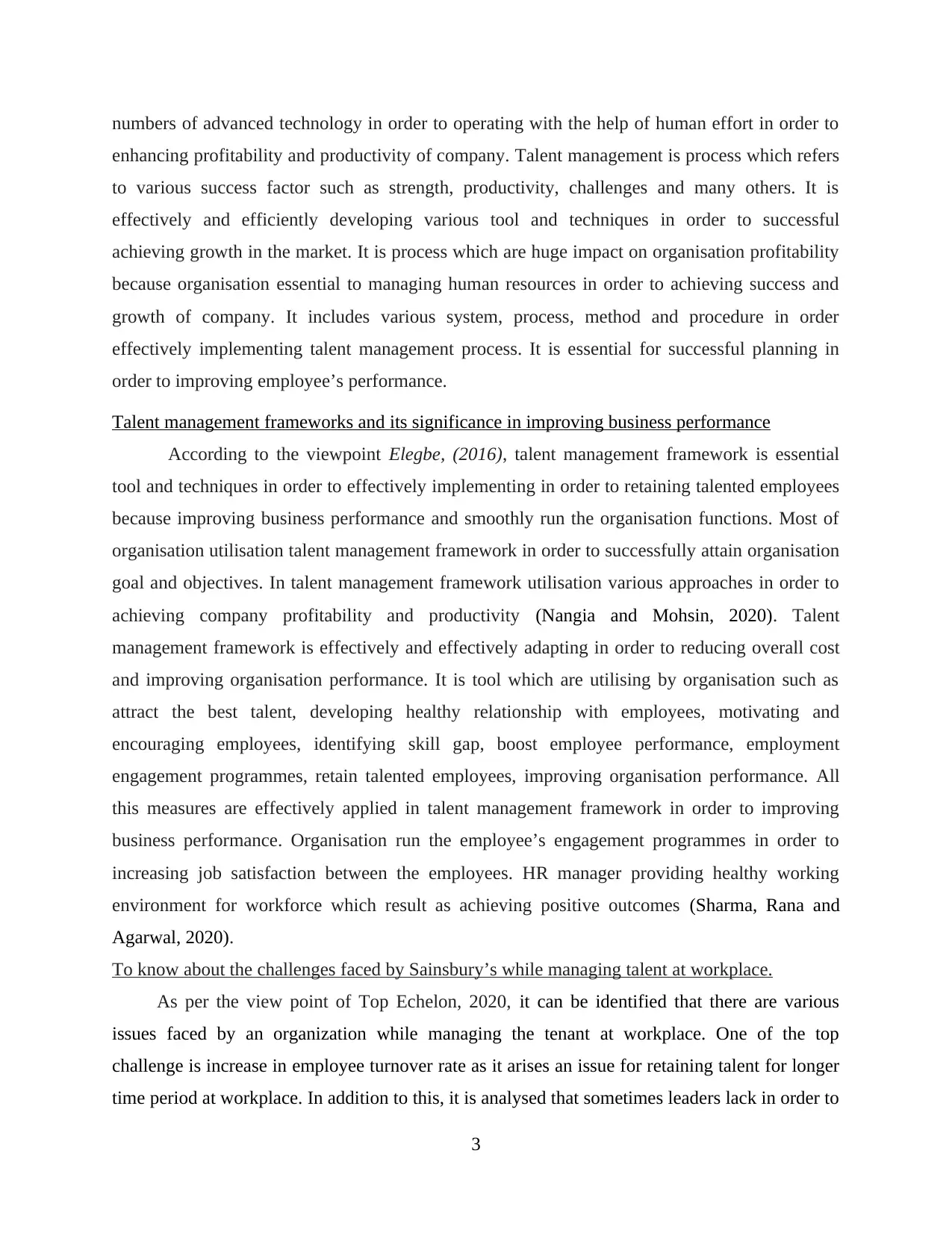
numbers of advanced technology in order to operating with the help of human effort in order to
enhancing profitability and productivity of company. Talent management is process which refers
to various success factor such as strength, productivity, challenges and many others. It is
effectively and efficiently developing various tool and techniques in order to successful
achieving growth in the market. It is process which are huge impact on organisation profitability
because organisation essential to managing human resources in order to achieving success and
growth of company. It includes various system, process, method and procedure in order
effectively implementing talent management process. It is essential for successful planning in
order to improving employee’s performance.
Talent management frameworks and its significance in improving business performance
According to the viewpoint Elegbe, (2016), talent management framework is essential
tool and techniques in order to effectively implementing in order to retaining talented employees
because improving business performance and smoothly run the organisation functions. Most of
organisation utilisation talent management framework in order to successfully attain organisation
goal and objectives. In talent management framework utilisation various approaches in order to
achieving company profitability and productivity (Nangia and Mohsin, 2020). Talent
management framework is effectively and effectively adapting in order to reducing overall cost
and improving organisation performance. It is tool which are utilising by organisation such as
attract the best talent, developing healthy relationship with employees, motivating and
encouraging employees, identifying skill gap, boost employee performance, employment
engagement programmes, retain talented employees, improving organisation performance. All
this measures are effectively applied in talent management framework in order to improving
business performance. Organisation run the employee’s engagement programmes in order to
increasing job satisfaction between the employees. HR manager providing healthy working
environment for workforce which result as achieving positive outcomes (Sharma, Rana and
Agarwal, 2020).
To know about the challenges faced by Sainsbury’s while managing talent at workplace.
As per the view point of Top Echelon, 2020, it can be identified that there are various
issues faced by an organization while managing the tenant at workplace. One of the top
challenge is increase in employee turnover rate as it arises an issue for retaining talent for longer
time period at workplace. In addition to this, it is analysed that sometimes leaders lack in order to
3
enhancing profitability and productivity of company. Talent management is process which refers
to various success factor such as strength, productivity, challenges and many others. It is
effectively and efficiently developing various tool and techniques in order to successful
achieving growth in the market. It is process which are huge impact on organisation profitability
because organisation essential to managing human resources in order to achieving success and
growth of company. It includes various system, process, method and procedure in order
effectively implementing talent management process. It is essential for successful planning in
order to improving employee’s performance.
Talent management frameworks and its significance in improving business performance
According to the viewpoint Elegbe, (2016), talent management framework is essential
tool and techniques in order to effectively implementing in order to retaining talented employees
because improving business performance and smoothly run the organisation functions. Most of
organisation utilisation talent management framework in order to successfully attain organisation
goal and objectives. In talent management framework utilisation various approaches in order to
achieving company profitability and productivity (Nangia and Mohsin, 2020). Talent
management framework is effectively and effectively adapting in order to reducing overall cost
and improving organisation performance. It is tool which are utilising by organisation such as
attract the best talent, developing healthy relationship with employees, motivating and
encouraging employees, identifying skill gap, boost employee performance, employment
engagement programmes, retain talented employees, improving organisation performance. All
this measures are effectively applied in talent management framework in order to improving
business performance. Organisation run the employee’s engagement programmes in order to
increasing job satisfaction between the employees. HR manager providing healthy working
environment for workforce which result as achieving positive outcomes (Sharma, Rana and
Agarwal, 2020).
To know about the challenges faced by Sainsbury’s while managing talent at workplace.
As per the view point of Top Echelon, 2020, it can be identified that there are various
issues faced by an organization while managing the tenant at workplace. One of the top
challenge is increase in employee turnover rate as it arises an issue for retaining talent for longer
time period at workplace. In addition to this, it is analysed that sometimes leaders lack in order to
3
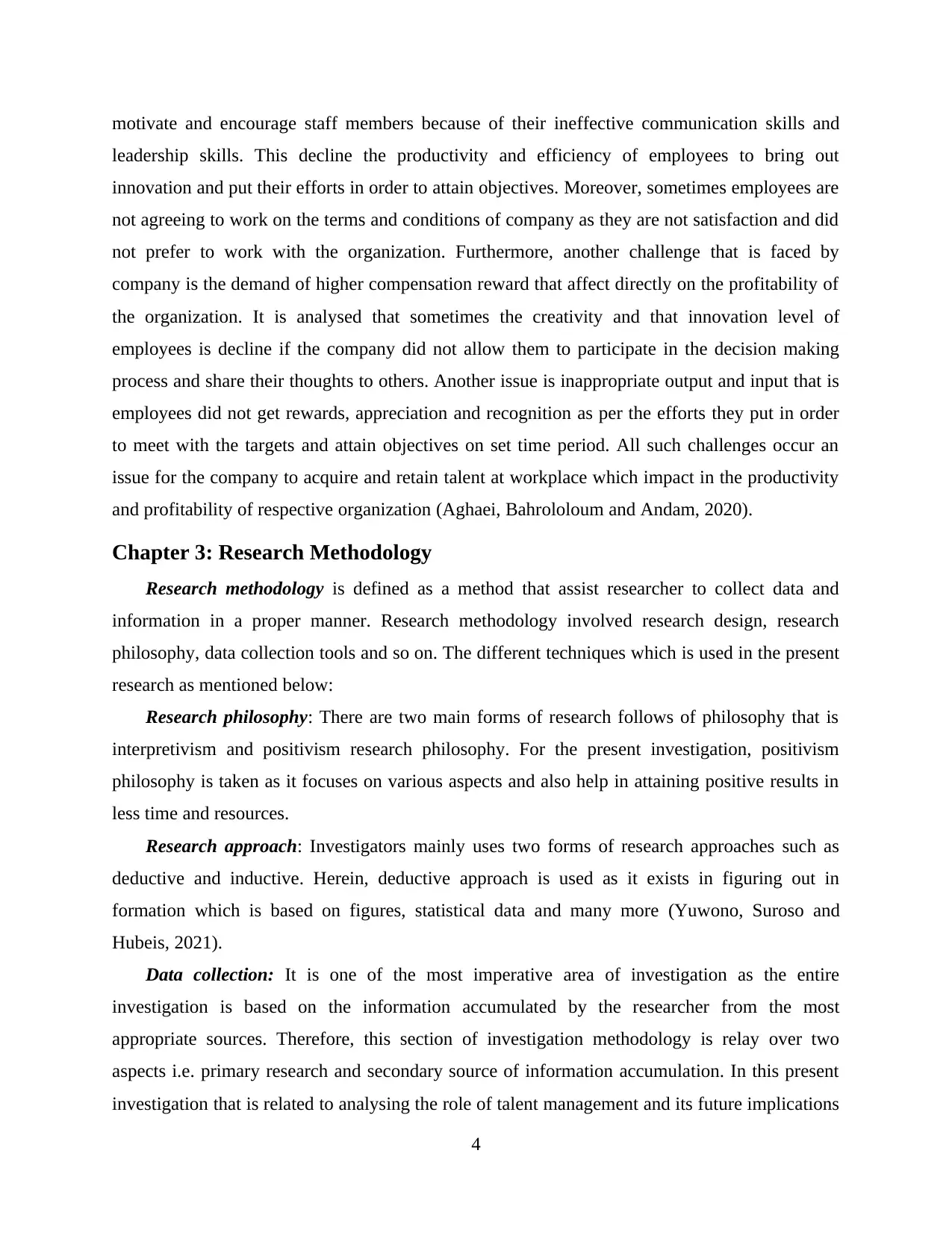
motivate and encourage staff members because of their ineffective communication skills and
leadership skills. This decline the productivity and efficiency of employees to bring out
innovation and put their efforts in order to attain objectives. Moreover, sometimes employees are
not agreeing to work on the terms and conditions of company as they are not satisfaction and did
not prefer to work with the organization. Furthermore, another challenge that is faced by
company is the demand of higher compensation reward that affect directly on the profitability of
the organization. It is analysed that sometimes the creativity and that innovation level of
employees is decline if the company did not allow them to participate in the decision making
process and share their thoughts to others. Another issue is inappropriate output and input that is
employees did not get rewards, appreciation and recognition as per the efforts they put in order
to meet with the targets and attain objectives on set time period. All such challenges occur an
issue for the company to acquire and retain talent at workplace which impact in the productivity
and profitability of respective organization (Aghaei, Bahrololoum and Andam, 2020).
Chapter 3: Research Methodology
Research methodology is defined as a method that assist researcher to collect data and
information in a proper manner. Research methodology involved research design, research
philosophy, data collection tools and so on. The different techniques which is used in the present
research as mentioned below:
Research philosophy: There are two main forms of research follows of philosophy that is
interpretivism and positivism research philosophy. For the present investigation, positivism
philosophy is taken as it focuses on various aspects and also help in attaining positive results in
less time and resources.
Research approach: Investigators mainly uses two forms of research approaches such as
deductive and inductive. Herein, deductive approach is used as it exists in figuring out in
formation which is based on figures, statistical data and many more (Yuwono, Suroso and
Hubeis, 2021).
Data collection: It is one of the most imperative area of investigation as the entire
investigation is based on the information accumulated by the researcher from the most
appropriate sources. Therefore, this section of investigation methodology is relay over two
aspects i.e. primary research and secondary source of information accumulation. In this present
investigation that is related to analysing the role of talent management and its future implications
4
leadership skills. This decline the productivity and efficiency of employees to bring out
innovation and put their efforts in order to attain objectives. Moreover, sometimes employees are
not agreeing to work on the terms and conditions of company as they are not satisfaction and did
not prefer to work with the organization. Furthermore, another challenge that is faced by
company is the demand of higher compensation reward that affect directly on the profitability of
the organization. It is analysed that sometimes the creativity and that innovation level of
employees is decline if the company did not allow them to participate in the decision making
process and share their thoughts to others. Another issue is inappropriate output and input that is
employees did not get rewards, appreciation and recognition as per the efforts they put in order
to meet with the targets and attain objectives on set time period. All such challenges occur an
issue for the company to acquire and retain talent at workplace which impact in the productivity
and profitability of respective organization (Aghaei, Bahrololoum and Andam, 2020).
Chapter 3: Research Methodology
Research methodology is defined as a method that assist researcher to collect data and
information in a proper manner. Research methodology involved research design, research
philosophy, data collection tools and so on. The different techniques which is used in the present
research as mentioned below:
Research philosophy: There are two main forms of research follows of philosophy that is
interpretivism and positivism research philosophy. For the present investigation, positivism
philosophy is taken as it focuses on various aspects and also help in attaining positive results in
less time and resources.
Research approach: Investigators mainly uses two forms of research approaches such as
deductive and inductive. Herein, deductive approach is used as it exists in figuring out in
formation which is based on figures, statistical data and many more (Yuwono, Suroso and
Hubeis, 2021).
Data collection: It is one of the most imperative area of investigation as the entire
investigation is based on the information accumulated by the researcher from the most
appropriate sources. Therefore, this section of investigation methodology is relay over two
aspects i.e. primary research and secondary source of information accumulation. In this present
investigation that is related to analysing the role of talent management and its future implications
4
⊘ This is a preview!⊘
Do you want full access?
Subscribe today to unlock all pages.

Trusted by 1+ million students worldwide
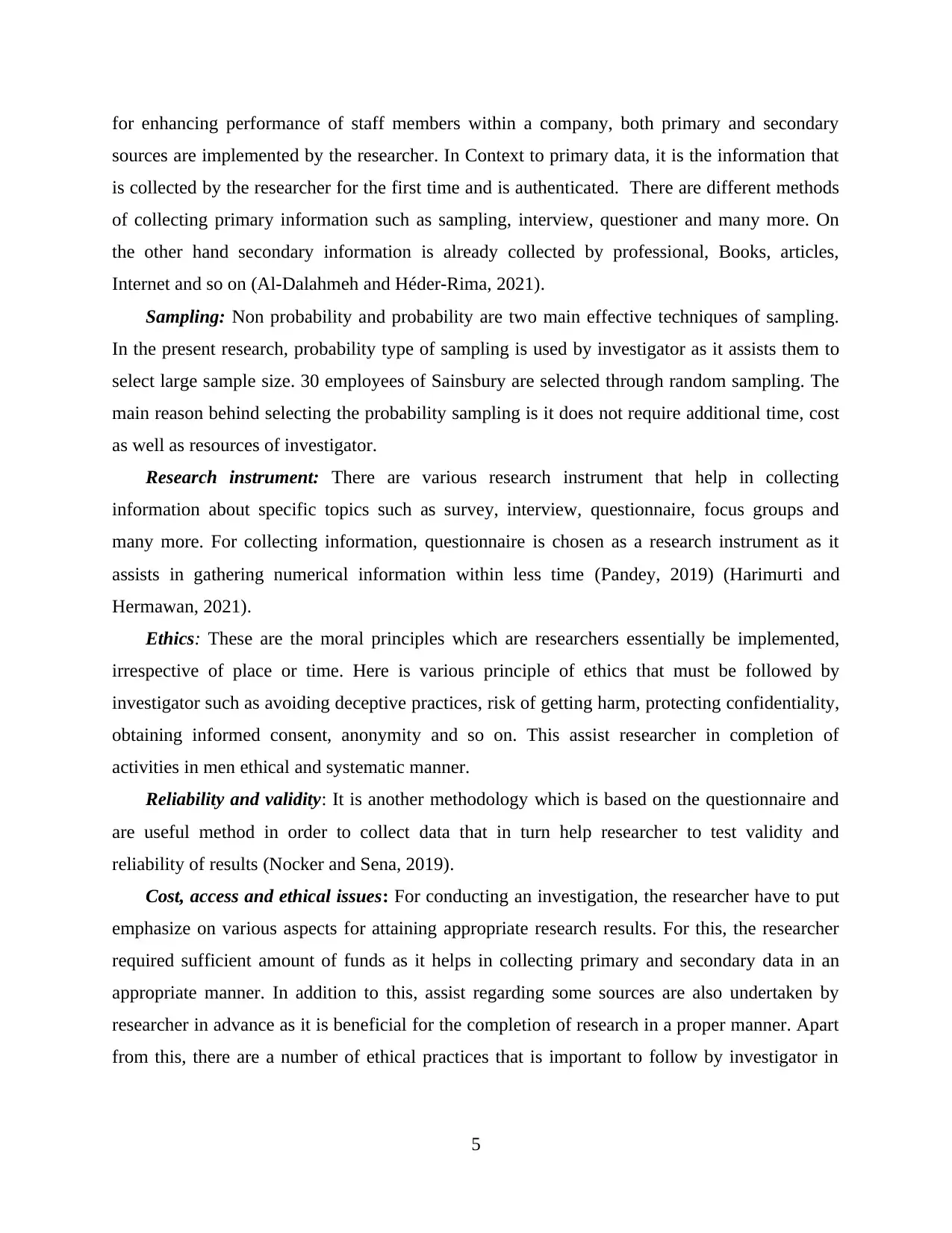
for enhancing performance of staff members within a company, both primary and secondary
sources are implemented by the researcher. In Context to primary data, it is the information that
is collected by the researcher for the first time and is authenticated. There are different methods
of collecting primary information such as sampling, interview, questioner and many more. On
the other hand secondary information is already collected by professional, Books, articles,
Internet and so on (Al-Dalahmeh and Héder-Rima, 2021).
Sampling: Non probability and probability are two main effective techniques of sampling.
In the present research, probability type of sampling is used by investigator as it assists them to
select large sample size. 30 employees of Sainsbury are selected through random sampling. The
main reason behind selecting the probability sampling is it does not require additional time, cost
as well as resources of investigator.
Research instrument: There are various research instrument that help in collecting
information about specific topics such as survey, interview, questionnaire, focus groups and
many more. For collecting information, questionnaire is chosen as a research instrument as it
assists in gathering numerical information within less time (Pandey, 2019) (Harimurti and
Hermawan, 2021).
Ethics: These are the moral principles which are researchers essentially be implemented,
irrespective of place or time. Here is various principle of ethics that must be followed by
investigator such as avoiding deceptive practices, risk of getting harm, protecting confidentiality,
obtaining informed consent, anonymity and so on. This assist researcher in completion of
activities in men ethical and systematic manner.
Reliability and validity: It is another methodology which is based on the questionnaire and
are useful method in order to collect data that in turn help researcher to test validity and
reliability of results (Nocker and Sena, 2019).
Cost, access and ethical issues: For conducting an investigation, the researcher have to put
emphasize on various aspects for attaining appropriate research results. For this, the researcher
required sufficient amount of funds as it helps in collecting primary and secondary data in an
appropriate manner. In addition to this, assist regarding some sources are also undertaken by
researcher in advance as it is beneficial for the completion of research in a proper manner. Apart
from this, there are a number of ethical practices that is important to follow by investigator in
5
sources are implemented by the researcher. In Context to primary data, it is the information that
is collected by the researcher for the first time and is authenticated. There are different methods
of collecting primary information such as sampling, interview, questioner and many more. On
the other hand secondary information is already collected by professional, Books, articles,
Internet and so on (Al-Dalahmeh and Héder-Rima, 2021).
Sampling: Non probability and probability are two main effective techniques of sampling.
In the present research, probability type of sampling is used by investigator as it assists them to
select large sample size. 30 employees of Sainsbury are selected through random sampling. The
main reason behind selecting the probability sampling is it does not require additional time, cost
as well as resources of investigator.
Research instrument: There are various research instrument that help in collecting
information about specific topics such as survey, interview, questionnaire, focus groups and
many more. For collecting information, questionnaire is chosen as a research instrument as it
assists in gathering numerical information within less time (Pandey, 2019) (Harimurti and
Hermawan, 2021).
Ethics: These are the moral principles which are researchers essentially be implemented,
irrespective of place or time. Here is various principle of ethics that must be followed by
investigator such as avoiding deceptive practices, risk of getting harm, protecting confidentiality,
obtaining informed consent, anonymity and so on. This assist researcher in completion of
activities in men ethical and systematic manner.
Reliability and validity: It is another methodology which is based on the questionnaire and
are useful method in order to collect data that in turn help researcher to test validity and
reliability of results (Nocker and Sena, 2019).
Cost, access and ethical issues: For conducting an investigation, the researcher have to put
emphasize on various aspects for attaining appropriate research results. For this, the researcher
required sufficient amount of funds as it helps in collecting primary and secondary data in an
appropriate manner. In addition to this, assist regarding some sources are also undertaken by
researcher in advance as it is beneficial for the completion of research in a proper manner. Apart
from this, there are a number of ethical practices that is important to follow by investigator in
5
Paraphrase This Document
Need a fresh take? Get an instant paraphrase of this document with our AI Paraphraser
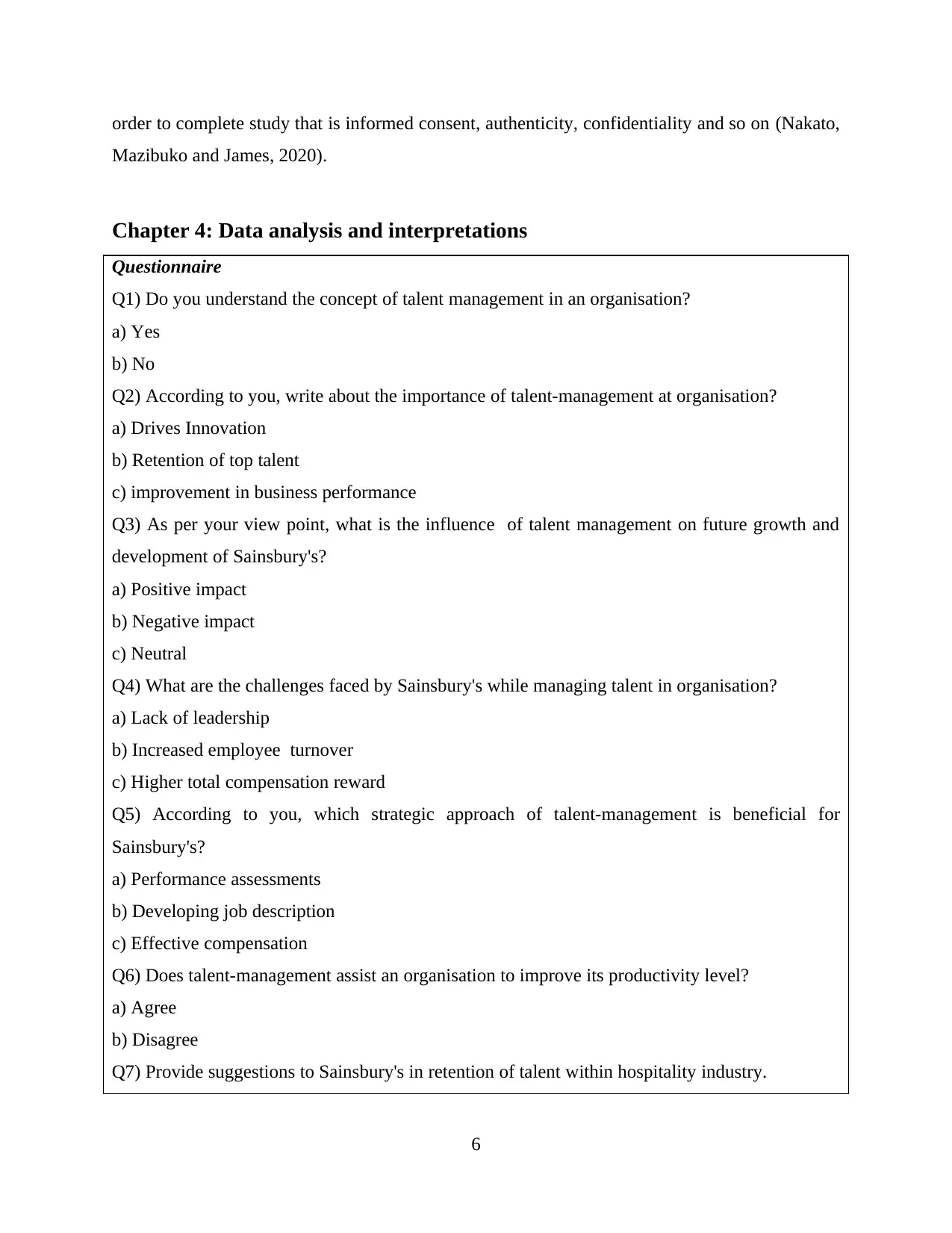
order to complete study that is informed consent, authenticity, confidentiality and so on (Nakato,
Mazibuko and James, 2020).
Chapter 4: Data analysis and interpretations
Questionnaire
Q1) Do you understand the concept of talent management in an organisation?
a) Yes
b) No
Q2) According to you, write about the importance of talent-management at organisation?
a) Drives Innovation
b) Retention of top talent
c) improvement in business performance
Q3) As per your view point, what is the influence of talent management on future growth and
development of Sainsbury's?
a) Positive impact
b) Negative impact
c) Neutral
Q4) What are the challenges faced by Sainsbury's while managing talent in organisation?
a) Lack of leadership
b) Increased employee turnover
c) Higher total compensation reward
Q5) According to you, which strategic approach of talent-management is beneficial for
Sainsbury's?
a) Performance assessments
b) Developing job description
c) Effective compensation
Q6) Does talent-management assist an organisation to improve its productivity level?
a) Agree
b) Disagree
Q7) Provide suggestions to Sainsbury's in retention of talent within hospitality industry.
6
Mazibuko and James, 2020).
Chapter 4: Data analysis and interpretations
Questionnaire
Q1) Do you understand the concept of talent management in an organisation?
a) Yes
b) No
Q2) According to you, write about the importance of talent-management at organisation?
a) Drives Innovation
b) Retention of top talent
c) improvement in business performance
Q3) As per your view point, what is the influence of talent management on future growth and
development of Sainsbury's?
a) Positive impact
b) Negative impact
c) Neutral
Q4) What are the challenges faced by Sainsbury's while managing talent in organisation?
a) Lack of leadership
b) Increased employee turnover
c) Higher total compensation reward
Q5) According to you, which strategic approach of talent-management is beneficial for
Sainsbury's?
a) Performance assessments
b) Developing job description
c) Effective compensation
Q6) Does talent-management assist an organisation to improve its productivity level?
a) Agree
b) Disagree
Q7) Provide suggestions to Sainsbury's in retention of talent within hospitality industry.
6
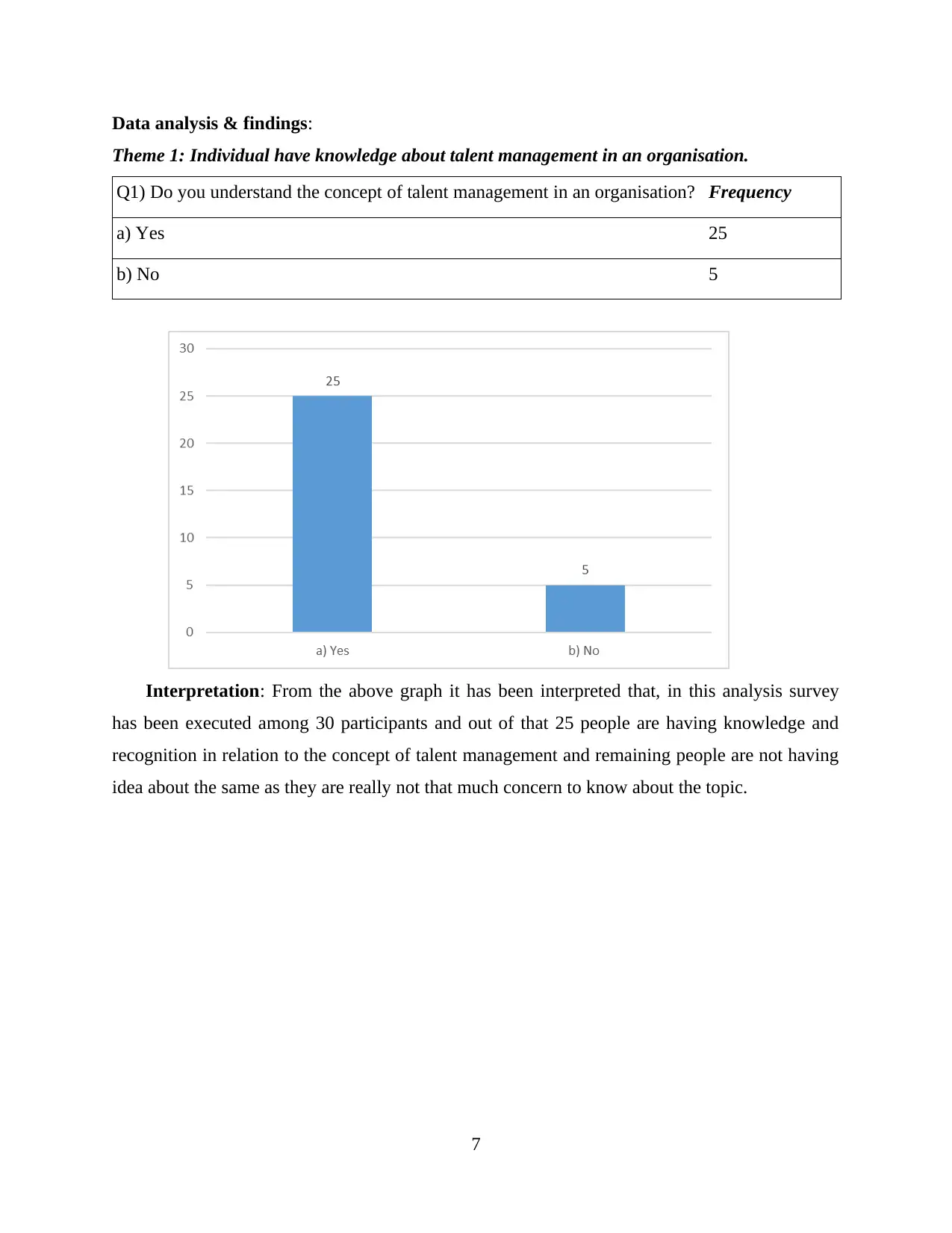
Data analysis & findings:
Theme 1: Individual have knowledge about talent management in an organisation.
Q1) Do you understand the concept of talent management in an organisation? Frequency
a) Yes 25
b) No 5
Interpretation: From the above graph it has been interpreted that, in this analysis survey
has been executed among 30 participants and out of that 25 people are having knowledge and
recognition in relation to the concept of talent management and remaining people are not having
idea about the same as they are really not that much concern to know about the topic.
7
Theme 1: Individual have knowledge about talent management in an organisation.
Q1) Do you understand the concept of talent management in an organisation? Frequency
a) Yes 25
b) No 5
Interpretation: From the above graph it has been interpreted that, in this analysis survey
has been executed among 30 participants and out of that 25 people are having knowledge and
recognition in relation to the concept of talent management and remaining people are not having
idea about the same as they are really not that much concern to know about the topic.
7
⊘ This is a preview!⊘
Do you want full access?
Subscribe today to unlock all pages.

Trusted by 1+ million students worldwide
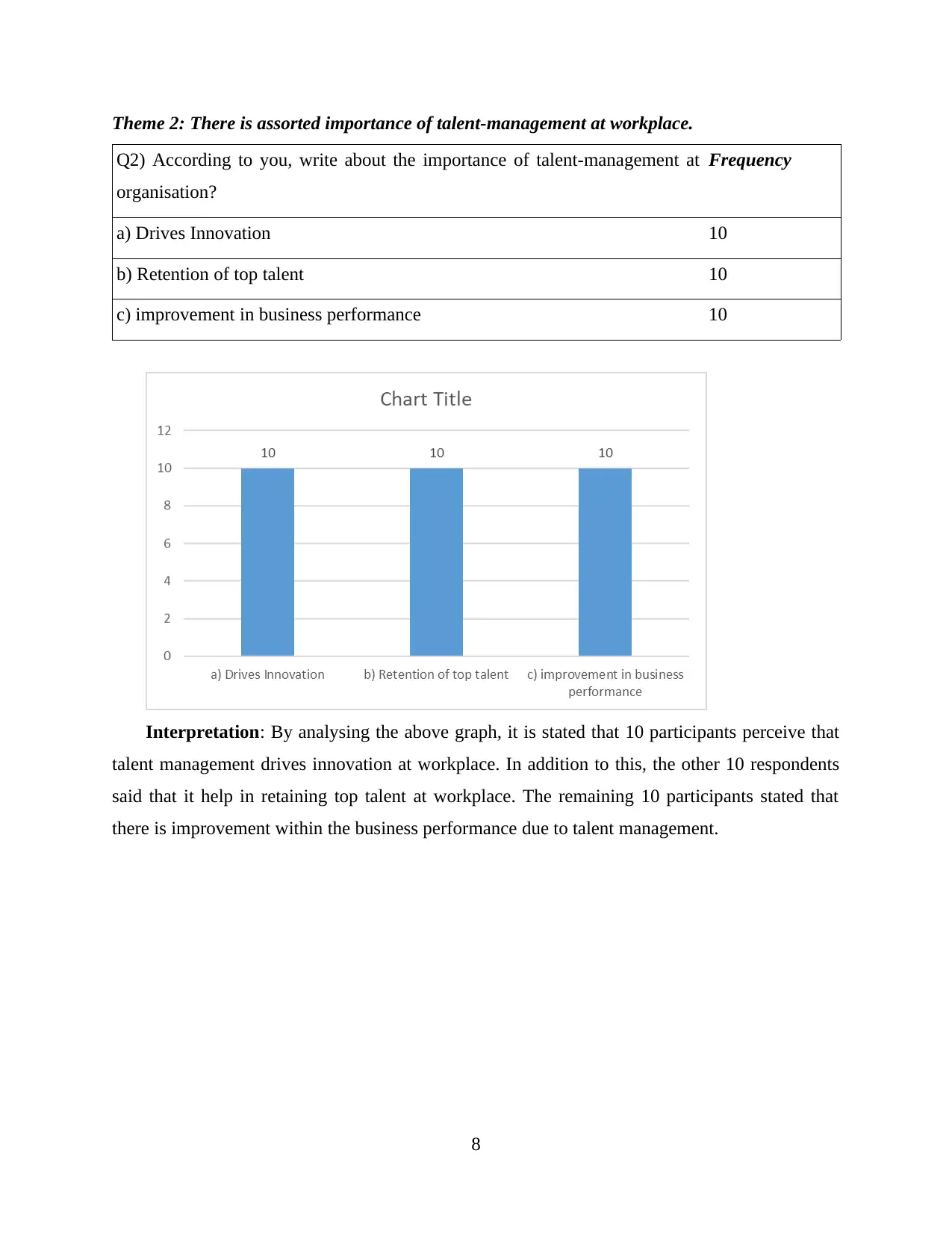
Theme 2: There is assorted importance of talent-management at workplace.
Q2) According to you, write about the importance of talent-management at
organisation?
Frequency
a) Drives Innovation 10
b) Retention of top talent 10
c) improvement in business performance 10
Interpretation: By analysing the above graph, it is stated that 10 participants perceive that
talent management drives innovation at workplace. In addition to this, the other 10 respondents
said that it help in retaining top talent at workplace. The remaining 10 participants stated that
there is improvement within the business performance due to talent management.
8
Q2) According to you, write about the importance of talent-management at
organisation?
Frequency
a) Drives Innovation 10
b) Retention of top talent 10
c) improvement in business performance 10
Interpretation: By analysing the above graph, it is stated that 10 participants perceive that
talent management drives innovation at workplace. In addition to this, the other 10 respondents
said that it help in retaining top talent at workplace. The remaining 10 participants stated that
there is improvement within the business performance due to talent management.
8
Paraphrase This Document
Need a fresh take? Get an instant paraphrase of this document with our AI Paraphraser
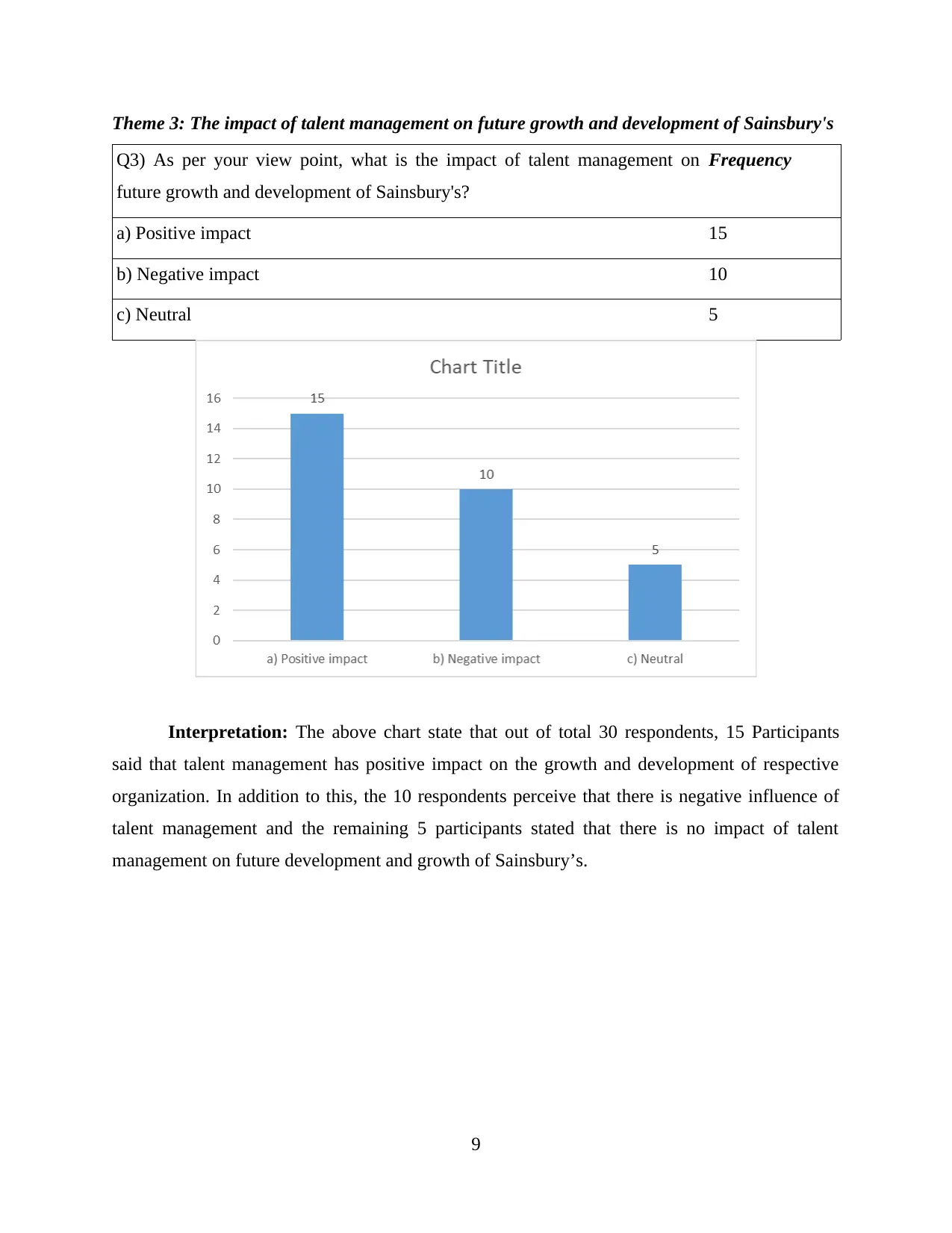
Theme 3: The impact of talent management on future growth and development of Sainsbury's
Q3) As per your view point, what is the impact of talent management on
future growth and development of Sainsbury's?
Frequency
a) Positive impact 15
b) Negative impact 10
c) Neutral 5
Interpretation: The above chart state that out of total 30 respondents, 15 Participants
said that talent management has positive impact on the growth and development of respective
organization. In addition to this, the 10 respondents perceive that there is negative influence of
talent management and the remaining 5 participants stated that there is no impact of talent
management on future development and growth of Sainsbury’s.
9
Q3) As per your view point, what is the impact of talent management on
future growth and development of Sainsbury's?
Frequency
a) Positive impact 15
b) Negative impact 10
c) Neutral 5
Interpretation: The above chart state that out of total 30 respondents, 15 Participants
said that talent management has positive impact on the growth and development of respective
organization. In addition to this, the 10 respondents perceive that there is negative influence of
talent management and the remaining 5 participants stated that there is no impact of talent
management on future development and growth of Sainsbury’s.
9
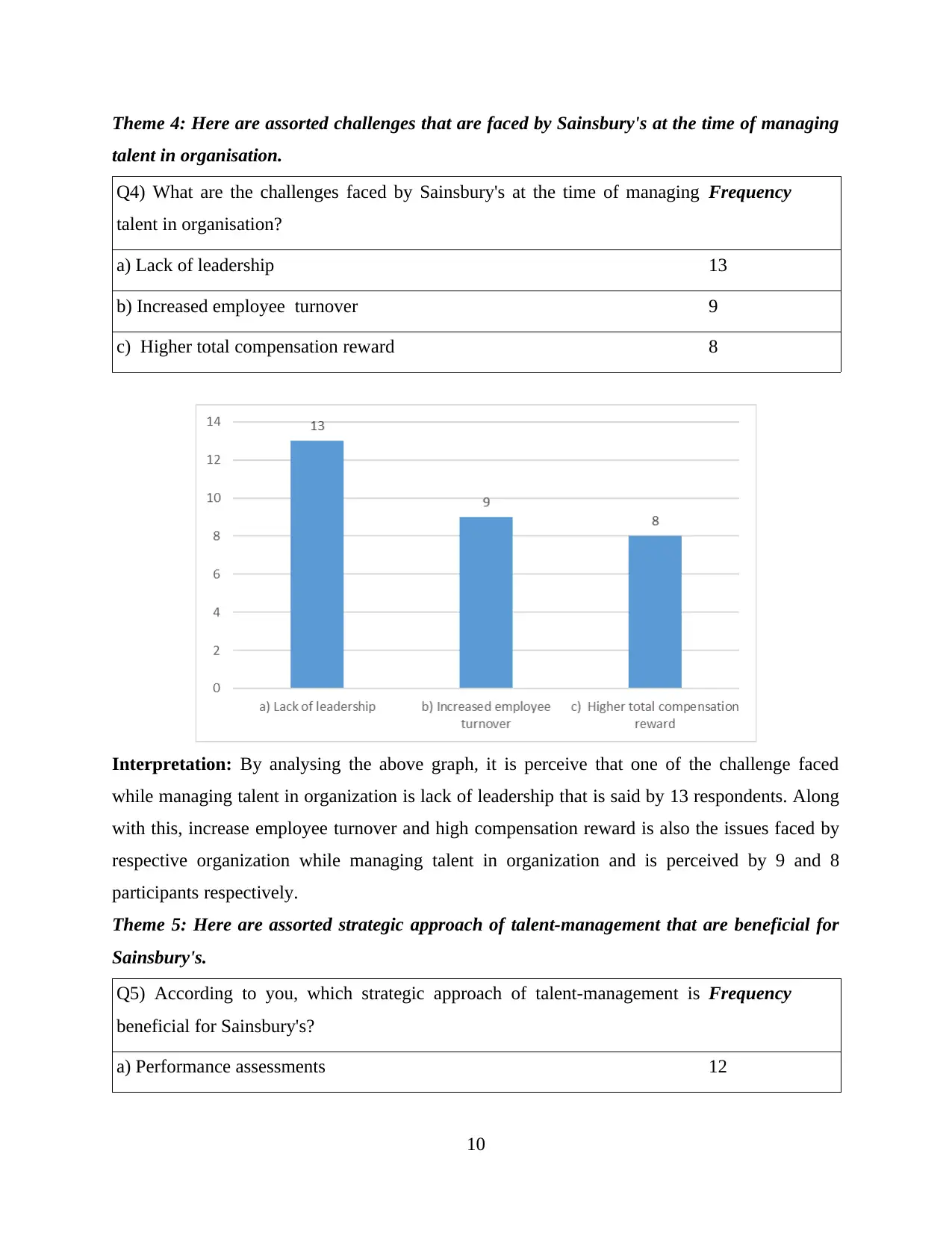
Theme 4: Here are assorted challenges that are faced by Sainsbury's at the time of managing
talent in organisation.
Q4) What are the challenges faced by Sainsbury's at the time of managing
talent in organisation?
Frequency
a) Lack of leadership 13
b) Increased employee turnover 9
c) Higher total compensation reward 8
Interpretation: By analysing the above graph, it is perceive that one of the challenge faced
while managing talent in organization is lack of leadership that is said by 13 respondents. Along
with this, increase employee turnover and high compensation reward is also the issues faced by
respective organization while managing talent in organization and is perceived by 9 and 8
participants respectively.
Theme 5: Here are assorted strategic approach of talent-management that are beneficial for
Sainsbury's.
Q5) According to you, which strategic approach of talent-management is
beneficial for Sainsbury's?
Frequency
a) Performance assessments 12
10
talent in organisation.
Q4) What are the challenges faced by Sainsbury's at the time of managing
talent in organisation?
Frequency
a) Lack of leadership 13
b) Increased employee turnover 9
c) Higher total compensation reward 8
Interpretation: By analysing the above graph, it is perceive that one of the challenge faced
while managing talent in organization is lack of leadership that is said by 13 respondents. Along
with this, increase employee turnover and high compensation reward is also the issues faced by
respective organization while managing talent in organization and is perceived by 9 and 8
participants respectively.
Theme 5: Here are assorted strategic approach of talent-management that are beneficial for
Sainsbury's.
Q5) According to you, which strategic approach of talent-management is
beneficial for Sainsbury's?
Frequency
a) Performance assessments 12
10
⊘ This is a preview!⊘
Do you want full access?
Subscribe today to unlock all pages.

Trusted by 1+ million students worldwide
1 out of 18
Related Documents
Your All-in-One AI-Powered Toolkit for Academic Success.
+13062052269
info@desklib.com
Available 24*7 on WhatsApp / Email
![[object Object]](/_next/static/media/star-bottom.7253800d.svg)
Unlock your academic potential
Copyright © 2020–2026 A2Z Services. All Rights Reserved. Developed and managed by ZUCOL.





